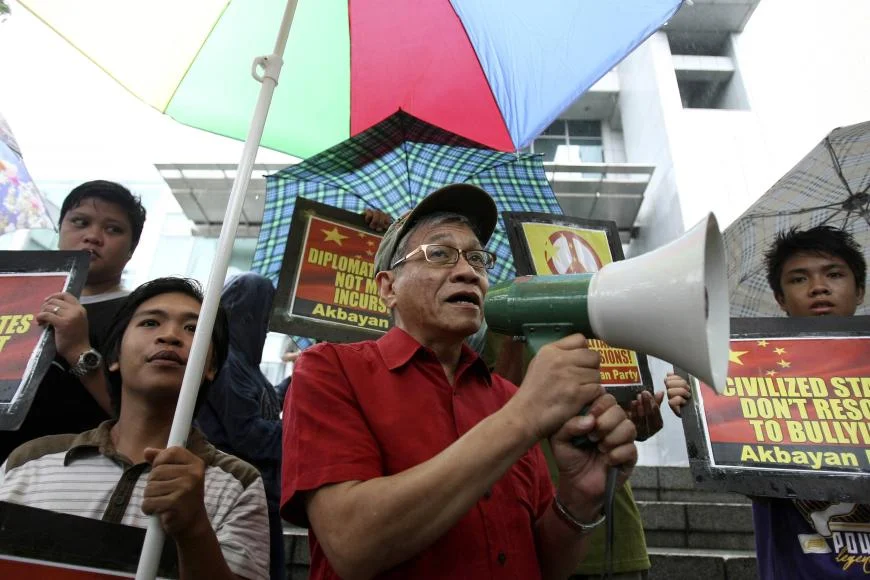Philippine Activist Walden Bello Arrested for Cyber-libel
NEWS, 29 Aug 2022
Carlos H. Conde | Human Rights Watch – TRANSCEND Media Service
Charges against Walden Bello Spotlight Criminal Defamation Laws
9 Aug 2022 – Philippine police yesterday arrested Walden Bello, a 76-year-old social activist, academic, and former congressman, at his home in Quezon City on charges of cyber-libel. The arrest was based on allegations by Jefry Tupas, a former information officer for Vice President Sara Duterte. Bello spent the night in jail before being released after paying bail.

Then-Congressman Walden Bello, center, addresses protesters during a rally outside of the Chinese consulate in Manila, Philippines, June 8, 2011.
© 2011 AP Photo/Bullit Marquez
Tupas, who worked for Duterte when she was mayor of Davao City, filed two counts of cyber-libel against Bello in March for a Facebook post alleging that Tupas was involved in illegal drugs after attending a party in November 2021 that was raided by the police.
Bello, a leftist progressive voice well-known in the Philippines and Southeast Asia, unsuccessfully ran for vice president in May. He used his candidacy as a platform to highlight progressive and social justice issues during the campaign. He is a long-time critic of the late Ferdinand Marcos, father of President Ferdinand Marcos Jr, and of former President Rodrigo Duterte, father of Vice-President Duterte. Sara Duterte denied any role in the libel case.
The Philippines’ cyber-libel law, passed in 2012, has been used several times against journalists, columnists, critics of the government, and ordinary social media users. The Office of Cybercrime at the Department of Justice reported that 3,700 cyber-libel cases were filed as of May 2022. Of that number, 1,317 were filed in court while 1,131 were dismissed. Twelve cases ended in a conviction.
Bello’s arrest underscores the need to revoke criminal libel and cyber-libel laws in the Philippines and elsewhere. As the United Nations Human Rights Committee stated in its general comment on freedom of expression, “imprisonment is never an appropriate penalty” for defamation. The UN special rapporteur on freedom of expression, Irene Khan, said in July after a Manila court upheld the cyber-libel conviction of Nobel Prize laureate Maria Ressa, “Criminal libel law has no place in a democratic country and should be repealed.”
As Human Rights Watch stated before the law was passed, criminal libel – against both offline and online expression – harms free speech and is frequently used to target critics of government officials. Laws like the cyber-libel law should be amended to remove criminal defamation provisions, in line with internationally accepted human rights and free speech standards.
_________________________________________________
Carlos H. Conde – Senior Researcher, Asia Division
Tags: Activism, Philippines
DISCLAIMER: The statements, views and opinions expressed in pieces republished here are solely those of the authors and do not necessarily represent those of TMS. In accordance with title 17 U.S.C. section 107, this material is distributed without profit to those who have expressed a prior interest in receiving the included information for research and educational purposes. TMS has no affiliation whatsoever with the originator of this article nor is TMS endorsed or sponsored by the originator. “GO TO ORIGINAL” links are provided as a convenience to our readers and allow for verification of authenticity. However, as originating pages are often updated by their originating host sites, the versions posted may not match the versions our readers view when clicking the “GO TO ORIGINAL” links. This site contains copyrighted material the use of which has not always been specifically authorized by the copyright owner. We are making such material available in our efforts to advance understanding of environmental, political, human rights, economic, democracy, scientific, and social justice issues, etc. We believe this constitutes a ‘fair use’ of any such copyrighted material as provided for in section 107 of the US Copyright Law. In accordance with Title 17 U.S.C. Section 107, the material on this site is distributed without profit to those who have expressed a prior interest in receiving the included information for research and educational purposes. For more information go to: http://www.law.cornell.edu/uscode/17/107.shtml. If you wish to use copyrighted material from this site for purposes of your own that go beyond ‘fair use’, you must obtain permission from the copyright owner.
